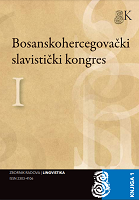Obrada tekstova jezika u dijaspori metodom korpusne lingvistike
Processing of different texts in languages in Diaspora by methods of corpus linguistics
Author(s): Aleksander UrkomSubject(s): Historical Linguistics, Comparative Linguistics, Sociolinguistics, South Slavic Languages
Published by: Slavistički komitet BiH
Keywords: language in diaspora; corpus linguistics; the language of Serbian minority in Hungary; interdisciplinary researching;
Summary/Abstract: In linguistics researching in Serbian and Hungarian languages very important part is researching in languages of minority groups (Serbian and Hungarian) which live in neighboring countries. Although these languages are based on the language of the mother country they are also enriched with elements of the language on the new territory. For example, if we examine the language of Serbian minority, and their culture, in today’s Hungary, we will find interesting examples. The Great Serb Migration at the end of XVII century from the Ottoman Empire to the Habsburg Monarchy caused that their language became a remote idiom of Serbian language which has partly developed paralle with the language in the mother country, but partly it has conserved some ancient forms and become a kind of “frozen” ancient language. It has also been exposed to the influence of Hungarian language structures and finally become the language in which we can find old and new and loan structures, as well. Creating the Corpus of the language of Serbian minority in Hungary is of primary importance because the Serbian language is used actively in minority’s everyday life. In Hungary besides weekly and monthly newspapers and magazines works Serbian radio and television, numerous novels and poems are published and significant scientific work is going on. Unfortunately in the past there were not any researchings in development of this language. Except smaller socio-linguistic analyses, the language of Serbian minority in Hungary was not described adequately, data were not collected or systematized and there were no any projects which dealt with the language development. Nowadays, Institute of Slavic and Baltic Studies in Budapest initiated the project of creating the corpus of Serbian language in Hungary. It has to imply printed materials in Serbian language in Hungary and its aim is to form a modern corpus processed in the most modern corpus linguistics technologies, suitable for researching and available on the Internet. The article also deals with the results of linguistic projects so far.
Journal: Bosanskohercegovački slavistički kongres
- Issue Year: I/2012
- Issue No: 1
- Page Range: 665-670
- Page Count: 6
- Language: Serbian

